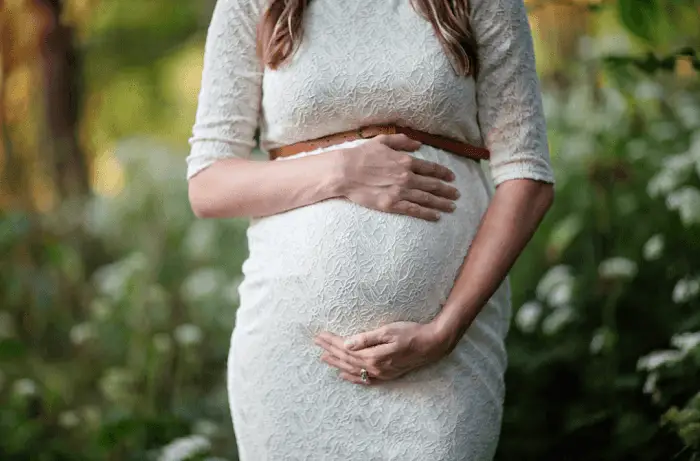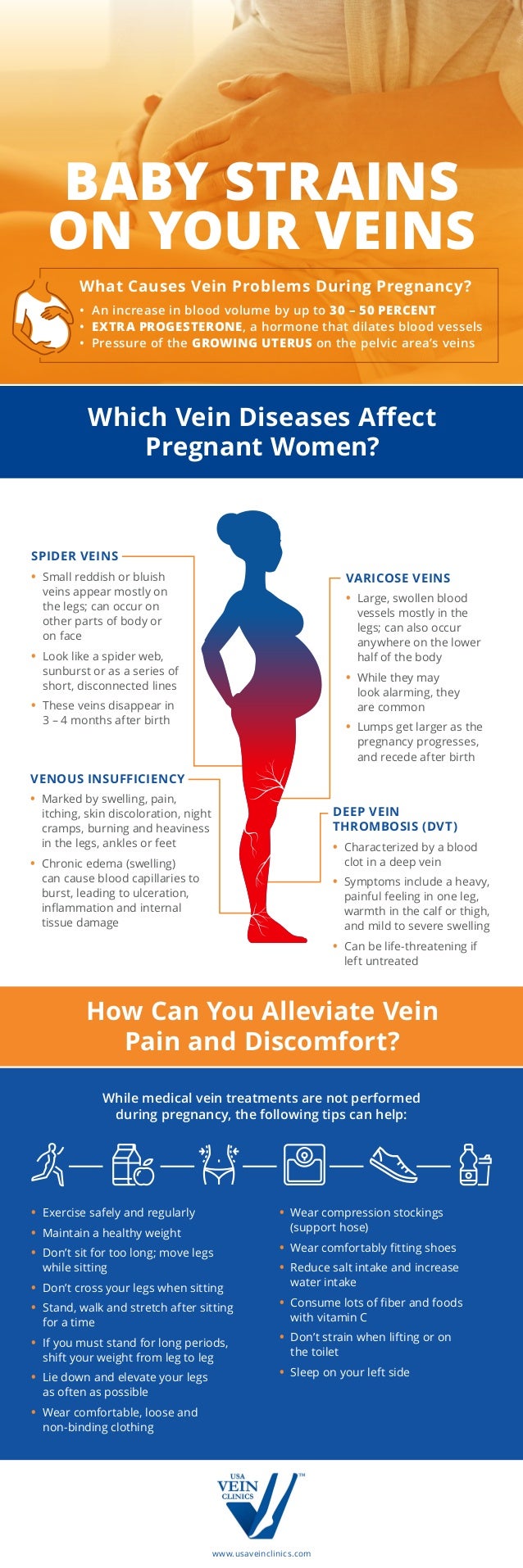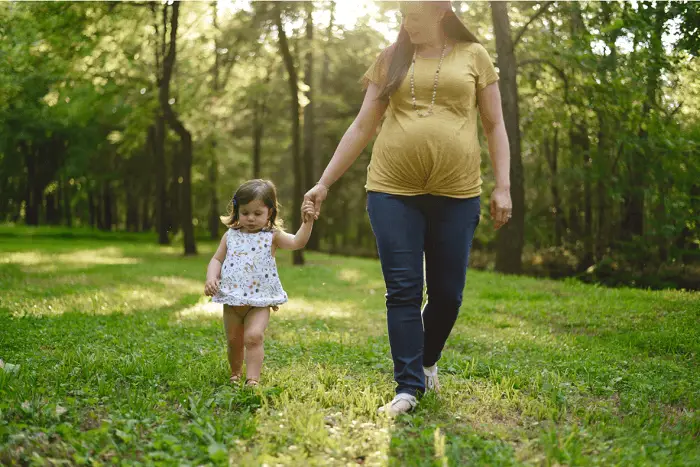Baby Strains On Veins and Its Effect On Pregnant Mother
There is so much to be excited about during pregnancy — not to mention a lot to learn. For example, did you know that carrying a baby can impact your veins? Throughout pregnancy, a woman’s blood volume increases by a whopping 30-50%. That alone is a significant adjustment for the body.
With all the extra blood pumping through the veins, it is only natural that other changes will occur and, in some cases, create problems. While not all pregnant women will deal with vein issues, the ones who do will understandably need a way to cope with the pain, swelling and other complications.
How Do You Know if You Have a Vein Disease?
If you suspect you have pregnancy-related vein disease, some symptoms that can help you identify the conditions and determine how serious they might be.
An expecting mom may notice spider-like clusters of reddish or bluish veins, for example, on the legs, face or elsewhere on her body. Additionally, she might develop large, swollen, protruding blood vessels in the lower half of her body, especially on the legs. Swelling, pain, and itching may also occur, as could a heavy, painful feeling in a specific leg.
The various vein issues that come up during pregnancy are frustrating at best and life-threatening at worst. Because they can be so serious, it is important for all expecting women to educate themselves on vein diseases and what to do about them.
Whether you are pregnant, a mom of young kids or a concerned loved one, here is a look at vein health and what you need to know.
Who Is Most at Risk for Pregnancy-Related Vein Issues?

While most pregnant women will not develop vein disease, the risk is still high. In fact, out of every 100 pregnant women, about 15[BV1] will develop varicose veins, usually in the second trimester — but why? What causes varicose veins and who is most at risk?
While family history and other health issues can all increase a woman’s risk, certain characteristics play a bigger role in vein health. These include:
- Hereditary factors: Genetics tend to be the biggest predictor of whether a woman will face pregnancy-related vein issues or not. If Chronic Venous Disease (CVD) is prevalent in her family, she has a much greater chance of experiencing it, too.
- Maternal age: When a woman is 35 or older during pregnancy, she is four times[BV2] more likely to develop varicose veins, at least compared to women who are pregnant in their twenties.
- Repeat pregnancies: In a woman’s first pregnancy, she has a smaller chance of facing varicose veins. With subsequent pregnancies, the risk doubles.
These factors are not absolute. Having some or all of the above characteristics does not mean a woman will definitely develop varicose veins or other vein issues while pregnant; it only increases the likelihood. An expecting mom who has these characteristics will want to pay close attention to vein health during her pregnancy.
[BV1]https://www.phlebolymphology.org/chronic-venous-disease-during-pregnancy/
[BV2]https://www.phlebolymphology.org/chronic-venous-disease-during-pregnancy/
What Can You Do About Spider or Varicose Veins?
Pregnant women can’t undergo treatment for vein issues, partly because the condition could be temporary. In the case of spider veins, they will usually disappear on their own three to four months after delivery. With varicose veins, the bothersome appearance often looks worse than the reality; this condition is fairly common, and the veins will usually recede after birth.
Nonetheless, because pregnant women cannot get treatment for these issues, they are often left searching for ways to alleviate the pain and discomfort. If this is your situation, what are your options?
The good news is you do not have to suffer without help. Here are a few tips to ease the pain and cope with a vein condition while pregnant:
- Stay active and exercise regularly to encourage proper blood flow.
- Maintain a healthy weight throughout pregnancy.
- Do not stay in a seated position for hours at a time; move often.
- Elevate your legs and lie down when you can.
- Choose cozy, loose-fitting clothing.
- Wear compression stockings/support hose.
- Always wear comfortable and properly fitting shoes.
- Drink lots of water and reduce your salt intake.
- Eat foods rich in fiber and vitamin C.
- Sleep on your left side.
While the above tips may not entirely prevent or cure vein issues during pregnancy, they can lessen the symptoms and pain so it’s easier for you to cope until delivery.
When Vein Issues Are Serious
While most of the vein issues that affect pregnant women are not life-threatening and will improve after the baby is born, it’s important to be aware of the other serious conditions that can occur.
Venous insufficiency, for example, can lead to ulceration, inflammation, and damage to tissues. This condition is marked by pain, swelling, itching, night cramps, skin discoloration and heaviness in the legs. Deep vein thrombosis (DVT) is characterized by a heaviness in the legs, pain and/or warmth and swelling. It can be a life-threatening malady caused by a blood clot in a deep vein.
To address these cases, it’s crucial to get extended rest and to do strategic exercises and compression therapy. The goal during pregnancy is to relieve symptoms and stop the progression of the condition. Then, after delivery, you can seek out further treatment and care.
For any woman facing varicose veins, spider veins or more serious vein complications while pregnant, it is important to see a medical professional. Once your specific condition is diagnosed, you can take steps to alleviate vein problems so that you have a smooth pregnancy and safely deliver your baby.
For more information about vein problems during pregnancy — what causes them, which diseases affect pregnant women and how to alleviate pain — take a look at the accompanying resource. Here you will find a full examination of how carrying a baby can impact a woman’s veins, presented in a visually friendly, easy-to-follow format.
 Graphic created by USA Vein Clinics, now offering virtual doctor visits.
Graphic created by USA Vein Clinics, now offering virtual doctor visits.Author bio: Dr. Yan Katsnelson is the founder of USA Vein Clinics, the largest, National network of vein treatment centers committed to improving lives through minimally invasive treatments of venous insufficiency. USA Vein Clinics specializes in the treatment of varicose veins and spider veins through endovenous laser treatment (EVLT), ClariVein, Varithena vein treatment, ultrasound-guided sclerotherapy, and sclerotherapy injections. USA Vein clinics offer in-person and telemedicine initial consultations.



